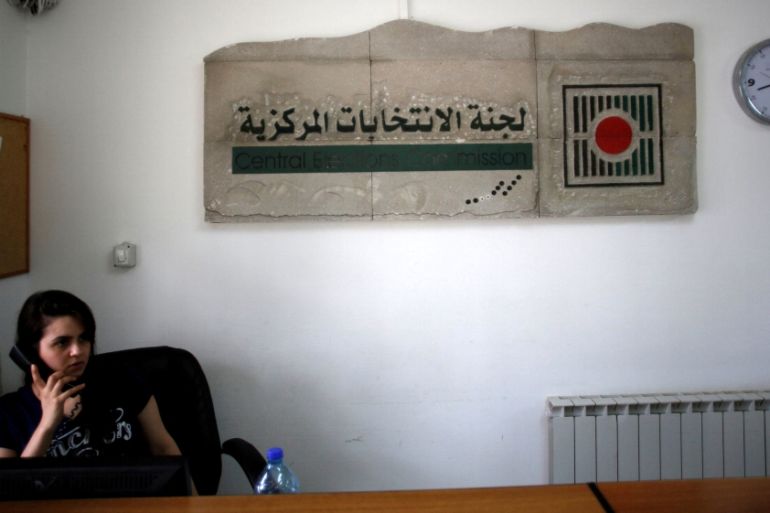Local Palestinian elections ‘referendum on Abbas rule’
The Palestinian Authority is buying time to avoid an electoral defeat, analysts say.

The fate of local elections in the occupied Palestinian territories remains unclear as Palestinian officials in the West Bank and the Gaza Strip continue to trade blame for the ongoing political impasse.
On Tuesday, the Palestinian Authority (PA), which governs the Israeli-occupied West Bank, announced that it would postpone the municipal elections for up to four months.
Keep reading
list of 4 itemsThe Take: As missiles fly above, settler violence surges in the West Bank
Israeli settlers set fire to cars, homes of Palestinians under occupation
‘We’re on the edge’: Palestinians terrified by Israeli settler violence
The move came after a high court in the West Bank ruled that the Gaza Strip would not be included in the elections, prompting an angry reaction from Hamas, the political movement that governs Gaza. The high court claimed that an illegitimate court in Gaza, under pressure from Hamas, had objected to several candidates from Fatah, the ruling party in the PA.
Hamas leaders denounced the high court’s decisions saying that the PA’s swift call to postpone the elections was politically motivated and accused the court of being biased.
“We consider the government’s decision an attempt to evade the election, to serve Fatah’s interests,” the group spokesperson said at a press conference in Gaza on Tuesday. “Hamas calls on the Central Elections Commission to stick to the completion of the electoral process from where it left off,” adding that the party rejects the court allegations against the legitimacy of its courts.
Hamas said Fatah was attempting to blow this “unexplained issue out of proportion to distract the Palestinian public and cover its political failure”.
READ MORE: Mahmoud Abbas still believes in Shimon Peres’ myth
This decision will entrench the intra-Palestinian divide and provide more evidence that neither Fatah nor Hamas is serious about the reconciliation or national unity.
While the PA said it does not intend to hold elections without the participation of the Gaza Strip, Fatah officials said there would be none until Hamas “sorts out its position”.
“Hamas obstructed the elections by using its illegitimate courts to drop nine Fatah electoral lists,” Osama al-Qawasmi, Fatah party spokesman, told Al Jazeera.
“We had an understanding with Hamas beforehand that the Central Elections Commission would be the point of reference. That’s why President Mahmoud Abbas took the decision to postpone the elections for four months. Fatah cannot accept having the elections only in the West Bank so we will wait until Hamas neutralises its position.”
The dispute between the two parties ruling the Palestinian territories exposes the deep divisions plaguing the Palestinian leadership.
The vote, initially scheduled for October 8, was intended for electing local councils in 416 Palestinian cities across the occupied territories. In the West Bank, where Abbas’ authority is non-negotiable, local elections are one of the few outlets for Palestinians to express their opinions.
|
|
The PA’s rapidly declining popularity among Palestinians, however, has led some analysts to believe that the PA was buying time to mend internal party division and gather support.
Waleed al-Modallal, the head of the political science department at the Islamic University of Gaza believes the PA was “taken aback by Hamas’ readiness to participate in the elections”. Hamas boycotted the local elections in 2012 over divisions between the two factions.
The decision to delay the elections stemmed from “PA fears that Hamas might win many seats in the Gaza and West Bank municipal councils,” al-Modallal told Al Jazeera, a point that has been echoed by several PA critics.
By postponing the vote, Fatah believes it will be able to “correct its position,” al-Modallal said.
When asked about fears within Fatah over an electoral defeat, al-Qawasmi said his “party knows they will not and cannot win all the municipal elections”, but will leave it to the Palestinian citizen to decide.
“Fatah’s fear was that votes might be going to its arch rival, Hamas, even though there is popular discontent with Hamas’ performance in Gaza,” Haidar Eid, a political writer based in Gaza, told Al Jazeera.
Eid believes that the decision to postpone the elections must be understood within the context of the PA’s “rule under the barrel gun of Israeli occupation”. “[The PA’s] role, as per Oslo is to make sure that no serious opposition, not to say, resistance, to occupation develops and starts posing a serious challenge to the whole political system that has been formed since the early 1990s.”
READ MORE: Palestine threatens to cut security ties with Israel
|
|
Under the Oslo Accords that aimed to establish an independent Palestinian state, the PA signed to share intelligence and coordinate with Israel on “security” matters. That is, working with Israel to crush dissent and opposition to the occupation – a point that has for long de-legitimised the PA leadership in the eyes of many Palestinians.
“The delay is a tactic on Abbas’ part because the vote is, in effect, a referendum on his rule,” Diana Buttu, a lawyer and former Palestinian negotiator, told Al Jazeera.
While the elections may well have served as a key for change on the ground, a new date for the vote has not been set.
“This decision will entrench the intra-Palestinian divide and provide more evidence that neither Fatah nor Hamas is serious about the reconciliation or national unity,” Alaa Tartir, programme director of Al-Shabaka Palestinian Policy Network, a Palestinian think-tank, told Al Jazeera.
“The ‘election mess’ that both Fatah and Hamas are creating should serve as another reminder for the utmost need of holding both parties and their leaderships accountable to the Palestinian people, so they do not cause further harm to the Palestinian struggle for freedom and self-determination.”